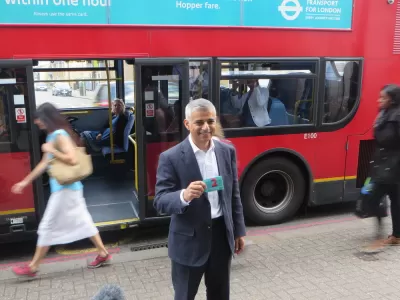A plan to completely overhaul the streets of London will require a "monumental" effort by all residents of the city, according to the mayor of London.

"The Mayor of London, Sadiq Khan, and Transport for London (TfL) have today announced plans to transform parts of central London into one of the largest car-free zones in any capital city in the world," according to a press release front he mayor's office.
According to the press release, the plan has a dual benefit: making it easier to maintain social distance, and improving the air quality in the city.
As for the physical changes proposed by the mayor, the press release describes several tiers of vehicle restrictions and pedestrian and bike priority:
Some streets will be converted to walking and cycling only, with others restricted to all traffic apart from buses, as part of the Mayor’s latest bold Streetspace measures. Streets between London Bridge and Shoreditch, Euston and Waterloo and Old Street and Holborn may be limited to buses, pedestrians and cyclists to help boost safe and sustainable travel as our city starts to gradually emerge from national Covid-19 restrictions. Access for emergency services and disabled people will be maintained, but deliveries on some streets may need to be made outside of congestion charging hours.
As noted in the press release, the car-free planning in response to the public health crisis of the coronavirus also reinstates the city's congestion charge, low emissions zone, and ultra low emissions zone programs.
FULL STORY: Car-free zones in London as Congestion Charge and ULEZ reinstated

Maui's Vacation Rental Debate Turns Ugly
Verbal attacks, misinformation campaigns and fistfights plague a high-stakes debate to convert thousands of vacation rentals into long-term housing.

Planetizen Federal Action Tracker
A weekly monitor of how Trump’s orders and actions are impacting planners and planning in America.

San Francisco Suspends Traffic Calming Amidst Record Deaths
Citing “a challenging fiscal landscape,” the city will cease the program on the heels of 42 traffic deaths, including 24 pedestrians.

Defunct Pittsburgh Power Plant to Become Residential Tower
A decommissioned steam heat plant will be redeveloped into almost 100 affordable housing units.

Trump Prompts Restructuring of Transportation Research Board in “Unprecedented Overreach”
The TRB has eliminated more than half of its committees including those focused on climate, equity, and cities.

Amtrak Rolls Out New Orleans to Alabama “Mardi Gras” Train
The new service will operate morning and evening departures between Mobile and New Orleans.
Urban Design for Planners 1: Software Tools
This six-course series explores essential urban design concepts using open source software and equips planners with the tools they need to participate fully in the urban design process.
Planning for Universal Design
Learn the tools for implementing Universal Design in planning regulations.
Heyer Gruel & Associates PA
JM Goldson LLC
Custer County Colorado
City of Camden Redevelopment Agency
City of Astoria
Transportation Research & Education Center (TREC) at Portland State University
Jefferson Parish Government
Camden Redevelopment Agency
City of Claremont





























